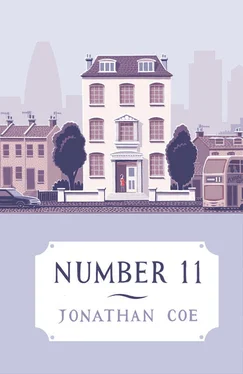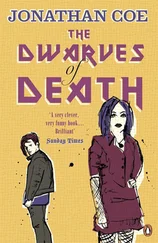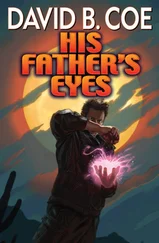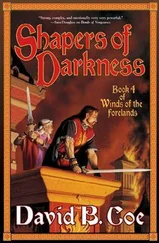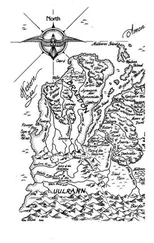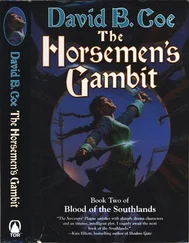‘So what are you doing now?’ Selena wanted to know. ‘Are the four of you still together?’
Val laughed. ‘No. We split up ages ago. Straight after we did our first album.’
‘But you’re still in the music business, right?’
‘Of course. I can’t stop writing and singing. It’s in my DNA.’
‘Val’s an incredibly creative person,’ Steve said, sliding a proprietorial arm around her shoulders.
‘And guess what?’ said Val, looking pointedly at her daughter, whose scepticism remained unspoken but, to everyone around the table, palpable. ‘Cheryl emailed me today about the new song.’
‘Really? That’s great. What does she think?’
‘She hasn’t had a chance to listen to it yet. But she said she was really looking forward to it.’
‘Oh, OK. Wow. Well, that’s a real breakthrough …’
The sarcasm was cruder and more bitter than she had intended. Val looked down, unable to meet her daughter’s gaze, and took three or four rapid sips from her gin and tonic.
‘Your mother doesn’t need that kind of cynicism right now,’ Steve said.
Alison’s eyes lit up angrily. ‘Why does it matter to you?’
‘Because Steve cares about me and my career,’ said Val. ‘He’s going to get me some downtime in the studio at college, so I can do a better version. You know — he’s doing something constructive. Something helpful.’
‘About that, love,’ he said, leaning in closer to her. ‘I’ve been having a word with Ricky, the engineer, and he reckons that Tuesday evenings would be the best. If you could come in after nine …’
Alison only half listened to the rest of their conversation. She could tell that Selena was feeling restless and embarrassed: maybe it had been a selfish idea to bring her here, to thrust her into the middle of this awkward family situation. It angered her, too, to see that Steve was already well on his way to being reinstalled as her mother’s confidant. Soon Val had taken out a letter she had been given at work that day — something about a reduction in her working hours — and was discussing it with him.
‘The thing is,’ she was saying, ‘I can’t support the two of us on anything less than I get at the moment. No way. It’s just not possible. Especially not with the winter coming up, and fuel bills …’
‘Don’t worry, babes,’ he said — the arm never leaving her shoulders, staking its claim to ownership ever more tightly — ‘we’ll sort something out. Just give me time to think about it.’
Alison’s glass was empty. So was Selena’s. She didn’t suggest buying another round.
‘Come on,’ she said. ‘I’ll walk you to the bus stop.’
Selena rose to her feet with every appearance of relief.
As they walked along Warwick Road, bathed in the evening sky’s final sunset glow, the smell of chips and kebabs and jerk chicken steaming out from the fast-food outlets, Alison took Selena’s arm and said:
‘Sorry. That was even more horrible than I was expecting.’
‘That’s OK. But you should have told me you had a famous mum. That’s just awesome.’
‘Well, she’s not famous any more, not by any stretch of the imagination. But she does write good songs still. I try to … hold on to that.’
‘What were she and Steve talking about just now?’ Selena asked. ‘When she was showing him that letter?’
‘Something to do with her work. She works in the library in Harborne.’
‘So that’s what she is now, is it? A librarian?’
They had reached Selena’s bus stop. They could see the bus in the distance, one set of traffic lights away.
‘At the moment, yeah,’ said Alison. ‘But even that’s not looking good. They’re cutting her hours back. Libraries aren’t getting the money any more.’
‘I thought they were building a big new one in town. Spending millions on it.’
‘True, but … Well, I don’t know. Don’t ask me how these things work.’
She spoke these words unthinkingly, formulaically, as the bus rumbled towards them and her conscious mind dissolved into panic at the thought of what form, exactly, her farewell to Selena should take. A hug, a friendly hand on the arm, a kiss on the cheek? In the event, it was a clumsy mash-up of all these things. The hug lasted longer than either of them had been expecting, and involved a certain amount of affectionate back-rubbing, and they touched cheeks rather than kissing; but in the process Alison’s lips brushed against Selena’s ear, and the memory of its texture stayed with her for the rest of that evening, along with her delicate, animal scent. As she walked home, she continued to savour them both, and realized that she was singing to herself, over and over, the chorus of her mother’s new song:
Still I try to do my best, but I need your breath
As the moonshine controls the water,
I will sink and swim.
*
Perry Barr — Handsworth — Winson Green — Bearwood — Harborne — Selly Oak — Cotteridge — Kings Heath — Hall Green — Acocks Green — Yardley — Stechford — Fox & Goose — Erdington — Witton — Perry Barr.
The weeks went by, the days grew shorter and colder, until one day, in early November, a turning point came.
Val’s hours had been reduced from four days to three mornings a week.
Her salary was cut in half and she was having to spend more time at home. The house was freezing. She started to worry about her next heating bill. And it was boring, sitting at home by herself all afternoon, watching daytime TV. Boring and lonely.
One Wednesday lunchtime she was coming home from the library on the Number 11 bus. She got on in Harborne and planned to get off close to her home in Yardley, a journey of some twenty-five minutes. But as she approached her stop, she changed her mind. The bus was warm; her house was cold. The bus was full of people; her house was empty. The view from her seat on the bus was ever-changing; the views from her house were monotonous. Suddenly she felt no inclination at all to get up from her comfortable seat and step out into the cold.
It was 1.15. A complete circuit of the city would bring her back to this same spot at 3.45. So that was what she did, and that was what she soon got into the habit of doing every day. Every working day, at first, but then, before long, she found that she was doing it on Tuesdays and Thursdays as well. Sometimes clockwise, sometimes anti-clockwise. Two and a half hours in which nothing was required of her, except to sit still, to watch the comings and goings of the other passengers, and to allow her thoughts to drift in spiralling patterns which mirrored the bus’s slow, circular progress.
Yardley — Stechford — Fox & Goose —
Why was her house so cold? Because she couldn’t afford to keep the radiators on all day. And even when they were on, she didn’t turn them up to 5 any more, the way she used to when winter came. Nowadays she never turned them higher than 2. Why not? Because the library couldn’t afford to pay her properly. Because the government had drastically reduced its budget for libraries. Because we were now all living — apparently — in an age of ‘austerity’.
— Fox & Goose — Erdington — Witton — Perry Barr — Handsworth —
This new buzzword — austerity — had only entered common currency about a year ago. What did it mean? In 2008 there had been a global financial crisis and some of the world’s largest banks had been on the point of collapse. The people had bailed them out and now, it seemed, in order to pay for this, public services would have to be slashed and benefits would have to be cut. But it was worth it because we had been living beyond our means and we were ‘all in this together’.
Читать дальше
